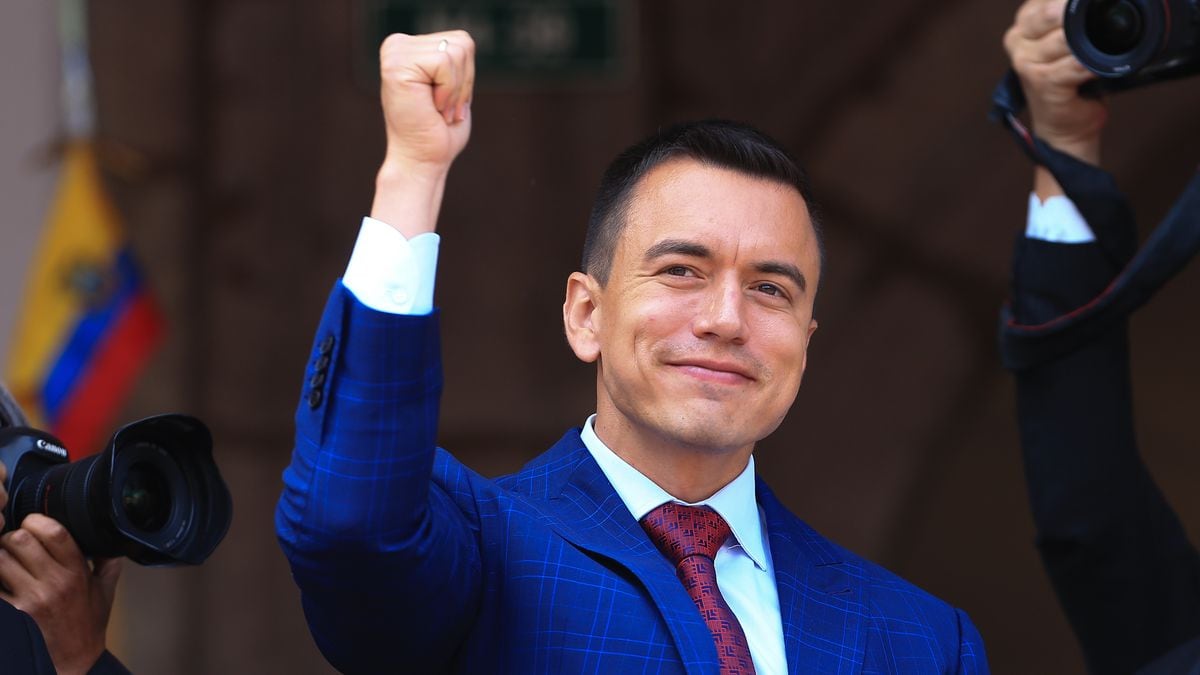The Government of Daniel Noboa has completed 100 days in power in the last week, without celebrations or long speeches.
The young Ecuadorian president, 36 years old, is rather a man of few words and short phrases.
He has passed the three-month threshold with high popularity, 82% of citizens positively approve of his management, according to the Cedatos survey, although people's main concern continues to be insecurity, followed by unemployment and corruption.
The new president assumed the Government on November 23 after a process of early elections when Guillermo Lasso decreed the death of a crusader.
He received a country with an insecurity crisis that bordered on 40 homicides per 100,000 inhabitants, an economic deficit of 5 billion dollars, a broken social fabric and a country without greater expectations.
But his popularity has been sustained above all by
heavy-handed
measures to combat organized crime.
The before and after of the Noboa Government was marked on January 9, when it went through one of the most critical moments in an escalation of violence that seemed to have no stop.
The prisons were taken over by prisoners, criminals spread terror in the streets with bomb attacks and a group of criminals hijacked a television channel that was broadcasting a live news program.
It was then that Noboa decreed an internal armed conflict, something unprecedented in the country, designated 22 organizations as terrorists and gave the military total control of security in the streets and prisons, which has received questions for violations of rights. humans.
The measure has helped the president not to have any opposition that questions his security model similar to Bukele's, and also with the support of the United States.
Noboa has managed to contain violence in the streets, with crimes drastically reduced by half.
The pact with the political parties of Revolución Ciudadana, of former president Rafael Correa, and Social Cristiano, of Jaime Nebot, has given him victories such as the approval of four laws and the image of governability in a country where State institutions are constantly in conflict. .
The first 100 days of the Noboa Government have even improved the social mood.
“There is an optimistic atmosphere,” acknowledges Mónica Heller, president of the Quito Chamber of Commerce.
“Because safety has been prioritized over economic matters, and that has generated a positive message, which improves the business environment,” she adds.
And she backs it up with figures: “As of January, at least 25% of our partners reported that their businesses were being extorted, by February it had decreased to 15%.”
But even with the high popularity that the president enjoys, not all of his measures are well received.
To finance the internal war and cover the fiscal deficit, Noboa proposed a tax reform to increase the value added tax, VAT, which will rise three points from April;
that is, 15%.
But eight out of 10 respondents think that the increase will affect them, according to an Opinion Profiles survey.
This reflects “a fragility in the numbers, people are so needy that they cling to quick solutions,” says Pedro Donoso, political analyst, but that “does not make Noboa a winner in all areas, but rather forces the president to work to have a sustainable valuation over time and that is achieved with management.”
We still need to see the president solve the underlying problems, such as education, health, employment, infrastructure and viability.
And that is when the long-term political project is not clear, nor is it known how it will be executed.
But the president adds achievements, such as having the Constitutional Court approve an 11-question questionnaire for the referendum and popular consultation that was a campaign promise.
For the fourth time in three years, Ecuadorians will go to the polls on April 21 to decide on issues such as whether the Armed Forces can be permanently in the entrance corridors of penitentiary centers for weapons control, increasing penalties for certain crimes, that the weapons seized in operations can be used by the Police and Armed Forces;
also the extradition of Ecuadorians and hourly work, a sensitive issue that has been a red line in all Governments.
“If the popular consultation wins, the president has to manage success, which is the most difficult thing.
Because people are going to want immediate solutions,” says Donoso.
With the acceptance that Noboa enjoys, a new victory seems to be assured, where he will also be measured against his political opponents with a view to the 2025 presidential elections, in which he will be a candidate again, and where the honeymoon of governance with the others parties could be broken, because from April they will become his campaign opponents.
Follow all the information from El PAÍS América on
and
X
, or in our
weekly newsletter
.
Subscribe to continue reading
Read without limits
Keep reading
I am already a subscriber
_

